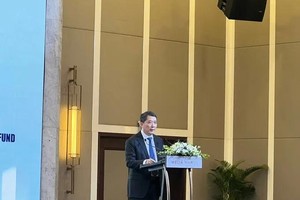
After 17 years in force, the 2007 Personal Income Tax (PIT) Law has revealed numerous shortcomings and inadequacies. A primary criticism is its progressive tax schedule, which many experts deem to have too many brackets spaced too closely together, creating an undue burden on taxpayers.
Currently, the schedule consists of seven brackets for income from wages and salaries. It starts with a 5 percent rate for monthly taxable income up to VND5 million (about US$196) and climbs to a top rate of 35 percent for income over VND80 million ($3,137) per month. With such narrow income bands, a modest monthly income increase of just VND5 million can push a taxpayer into a higher bracket.
To address this inadequacy, the Ministry of Finance has proposed simplifying the structure to five brackets of 5 percent, 15 percent, 25 percent, 30 percent, and 35 percent. Two options are on the table, primarily differing on the threshold for the highest tax rate.
While both options would raise the first bracket’s income threshold to VND10 million ($392) per month, Option 1 sets the top bracket at incomes over VND80 million ($3,137), whereas Option 2 raises this to over VND100 million ($3,922).
Regarding the dependent deduction, the Finance Ministry is also considering two options to increase the current allowance - VND11 million ($431) per month for the taxpayer and VND4.4 million ($173) per month per dependent (effective as of January 1, 2020).
Option 1 proposes raising these to VND13.3 million ($522) and VND5.3 million ($208), respectively. Option 2 suggests a more significant increase to VND15.5 million ($608) and VND6.2 million ($243).
According to Dr Do Thien Anh Tuan from the Fulbright School of Public Policy and Management, while raising the family deduction is a given, the more critical conversation revolves around raising the income thresholds for each tax bracket to account for nearly 17 years of inflation.
He cites a price slip of 215 percent since 2009. “This means that the VND5 million ($196) threshold for the lowest bracket in 2009 is equivalent to nearly VND11 million ($431) today”, Dr Tuan explained. “Following that logic, the top bracket of VND80 million ($3,137) from 2009 should now be VND172 million ($6,745).”
Consequently, he argues, even the proposed top-bracket threshold of VND80 million is already obsolete, as it’s equivalent to just VND37 million ($1,451) in 2009’s currency. He considers the VND100 million threshold in the second option to be equally outdated, noting it represents the salary of a mid-level manager, not necessarily the highest earners in today’s society.
Meanwhile, other experts are analyzing the unreasonable gaps between the brackets. Dr Nguyen Ngoc Tu, a lecturer at Hanoi University of Business and Technology, argues that the issue isn’t the 35 percent top rate itself.
“Many developed countries have higher top rates”, he notes, citing Sweden (56.6 percent) and Japan (50 percent). “However, the income bands between their tax brackets are significantly wider.” In Vietnam, the densely packed schedule puts immense pressure on taxpayers, especially those with lower incomes.
For President Nguyen Thi Cuc of the Vietnam Tax Consultants’ Association, the solution lies in a combined approach of raising dependent deductions while simultaneously widening the income gaps between brackets. She also advocates for tax reductions in key sectors to attract high-quality human resources, ensuring “both horizontal and vertical equity” in the tax system.
Deputy Minister of Finance Cao Anh Tuan has stated that the ministry will continue to gather feedback from all stakeholders. The draft amendment to the Personal Income Tax Law is scheduled to be presented to the National Assembly at its end-of-year session.
A key proposal in the draft law would grant the Government the authority to regulate family deductions, ensuring the flexibility to make adjustments in line with the nation’s socio-economic realities without requiring a full legislative overhaul each time.
Personal Income Tax is currently creating the third-largest source of revenue in the tax system, after value-added tax and corporate income tax.
























